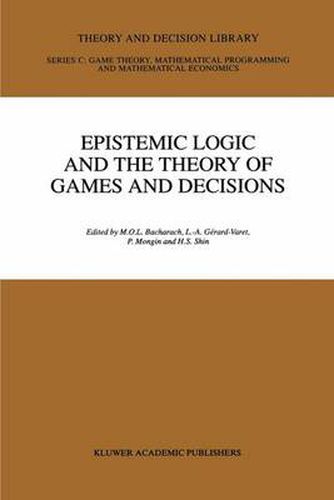Readings Newsletter
Become a Readings Member to make your shopping experience even easier.
Sign in or sign up for free!
You’re not far away from qualifying for FREE standard shipping within Australia
You’ve qualified for FREE standard shipping within Australia
The cart is loading…






This title is printed to order. This book may have been self-published. If so, we cannot guarantee the quality of the content. In the main most books will have gone through the editing process however some may not. We therefore suggest that you be aware of this before ordering this book. If in doubt check either the author or publisher’s details as we are unable to accept any returns unless they are faulty. Please contact us if you have any questions.
The convergence of game theory and epistemic logic has been in progress for two decades and this book explores this further by gathering specialists from different professional communities, i.e., economics, mathematics, philosophy, and computer science. This volume considers the issues of knowledge, belief and strategic interaction, with each contribution evaluating the foundational issues. In particular, emphasis is placed on epistemic logic and the representative topics of backward induction arguments and syntax/semantics and the logical omniscience problem. Part I of this collection deals with iterated knowledge in the multi-agent context, and more particularly with common knowledge. The first two papers in Part II of the collection addresses the so-called logical omniscience problem, a problem which has attracted much attention in the recent epistemic logic literature, and is pertinent to some of the issues discussed by decision theorists under the heading bounded rationality . The remaining two chapters of Part II provide two quite different angles on the strength of S5 (or the partitional model of information) - and so two different reasons for eschewing the strong form of logical omniscience implicit in S5. Part III gives attention to application to game theory and decision theory.
$9.00 standard shipping within Australia
FREE standard shipping within Australia for orders over $100.00
Express & International shipping calculated at checkout
This title is printed to order. This book may have been self-published. If so, we cannot guarantee the quality of the content. In the main most books will have gone through the editing process however some may not. We therefore suggest that you be aware of this before ordering this book. If in doubt check either the author or publisher’s details as we are unable to accept any returns unless they are faulty. Please contact us if you have any questions.
The convergence of game theory and epistemic logic has been in progress for two decades and this book explores this further by gathering specialists from different professional communities, i.e., economics, mathematics, philosophy, and computer science. This volume considers the issues of knowledge, belief and strategic interaction, with each contribution evaluating the foundational issues. In particular, emphasis is placed on epistemic logic and the representative topics of backward induction arguments and syntax/semantics and the logical omniscience problem. Part I of this collection deals with iterated knowledge in the multi-agent context, and more particularly with common knowledge. The first two papers in Part II of the collection addresses the so-called logical omniscience problem, a problem which has attracted much attention in the recent epistemic logic literature, and is pertinent to some of the issues discussed by decision theorists under the heading bounded rationality . The remaining two chapters of Part II provide two quite different angles on the strength of S5 (or the partitional model of information) - and so two different reasons for eschewing the strong form of logical omniscience implicit in S5. Part III gives attention to application to game theory and decision theory.